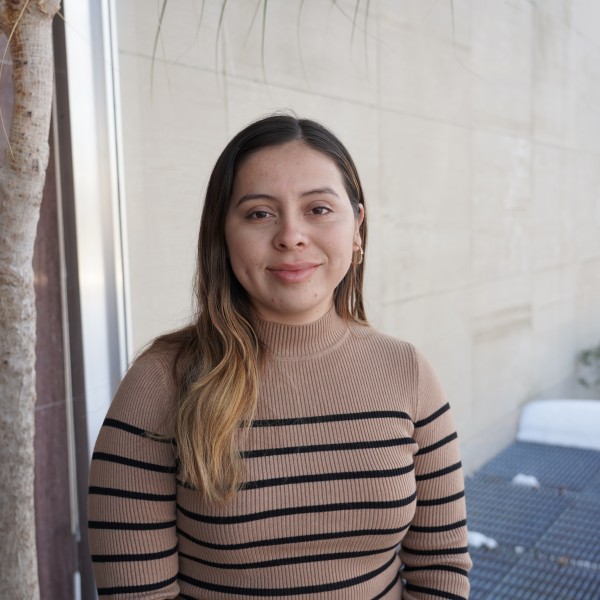- Cornell Institute for Digital Agriculture
- Animal Science
- Department of Communication
- School of Integrative Plant Science
- Agriculture
- Digital Agriculture
Development of the new minor was fueled by the founders and faculty of the Cornell Institute for Digital Agriculture (CIDA), an interdisciplinary community of leaders across Cornell in areas of expertise ranging from the life sciences to social sciences, engineering and computing science.
Supported by the College of Agriculture and Life Sciences, the College of Engineering, the Ann S. Bowers College of Computing and Information Science and the College of Veterinary Medicine, CIDA is committed to finding practical solutions that increase the sustainability of farming practices. The institute prioritizes outreach to educate and influence farmers, agricultural policy makers, and industry workers on new advancements to increase agricultural sustainability and prosperity.
The minor will be attractive to students with a broad range of interests about how food production, farms, and rural and global communities are being transformed through technologies. Areas of inquiry include how the implementation of digital agriculture is going to transform industries and rural communities and redefine what it means to be a farmer with access to large amounts of data.
The introductory course in digital agriculture, required for students in the minor, is available this fall as an elective to any student at Cornell. The goal of the introductory course is to expose students to the breadth and diversity of how digital tools are applied in the field of agriculture today, especially in food production systems. Students will explore and discuss the main drivers of the digital transformation in agriculture at a local and global scale. Two field trips will take students – and faculty – beyond the classroom to see firsthand how farms are integrating new technologies to improve animal and plant production systems.
“Special emphasis will be placed on the integration of basic concepts of systems biology, data science, and engineering,” said Julio Giordano, associate professor of animal science and a co-director of CIDA, who leads the class. “By bringing in faculty from the different colleges that make up CIDA, we are exposing students to the many areas that impact our food production systems – natural resources, earth and atmospheric sciences, food science, global development, and computer science and engineering, among others.”
“Perhaps the most amazing thing about the digital ag minor is the breadth of disciplines that it includes,” said Diane Bailey, former director of CIDA and member of CIDA’s education committee. “For any student curious about the planet, who cares about how we grow our food, where we get our food from, and the life of those who grow it, this is a fascinating minor.”
Julio Giordano teaching the digital agriculture class last fall.

“By introducing the digital agriculture minor to the engineering students, we are forging a path for our students to apply their technical and engineering skills in a rapidly evolving field,” said Fengqi You, CIDA co-director and the Roxanne E. and Michael J. Zak professor in energy systems engineering. “This will open doors to innovative solutions that will redefine agriculture and have far-reaching impact on both technology and food systems.”
Harry Samuels ’24 majors in animal science and is enrolled in the new minor. “When I came to Cornell, I was very excited by the wealth of classes offered in such a wide variety of topics. The digital agriculture minor will allow me to combine my interest in modern technology and the world of coding with the field of agriculture so that I can continue to explore both topics.”
Samuels wants to learn more about the impact of today’s technologies on animal science and agriculture. “The future of agriculture and the agriculture and food production industry is a super critical aspect of our society as a whole, no matter who you are.”
Students in the digital agriculture minor also will participate in CIDA’s annual hackathon with students from across Cornell and around the globe to address our most pressing agricultural challenges.
“Digital agriculture isn’t just something that’s happening in highly developed Western countries — it’s happening all across the world. We have really important issues of sustainability and climate change and feeding the world’s growing population that must be addressed,” said Bailey.
“It is wonderful to bring the benefits of this radical collaboration to the Cornell students via this minor,” said CIDA co-director Hakim Weatherspoon, professor of computer science in Bowers CIS.
Designated by the provost in 2019 as an area of Radical Collaboration, digital agriculture is an integral part of CALS’ commitment to unleash the power of transdisciplinary expertise to effect global change as detailed in its new Roadmap to 2050 strategic plan.
“It really is remarkable to have a private university and a Land Grant under the same roof with the kind of expertise that we have at Cornell,” said Susan McCouch, Ph.D. ’90, the Barbara McClintock Professor of Plant Breeding and Genetics in CALS and the inaugural director of CIDA. “Digital agriculture brings people from many different backgrounds together to get to know each other and to catalyze new ways of thinking about how to address the grand challenges facing food production systems today.”
Keep Exploring

News
The new, high-resolution maps calculate global emissions from croplands by region, crop and source – enabling hyper-local mitigation.
- Ashley School of Global Development and the Environment
- Global Development Section
- Agriculture

Field Note
- Animal Science
- Agriculture
- Field Crops

We openly share valuable knowledge.
Sign up for more insights, discoveries and solutions.


